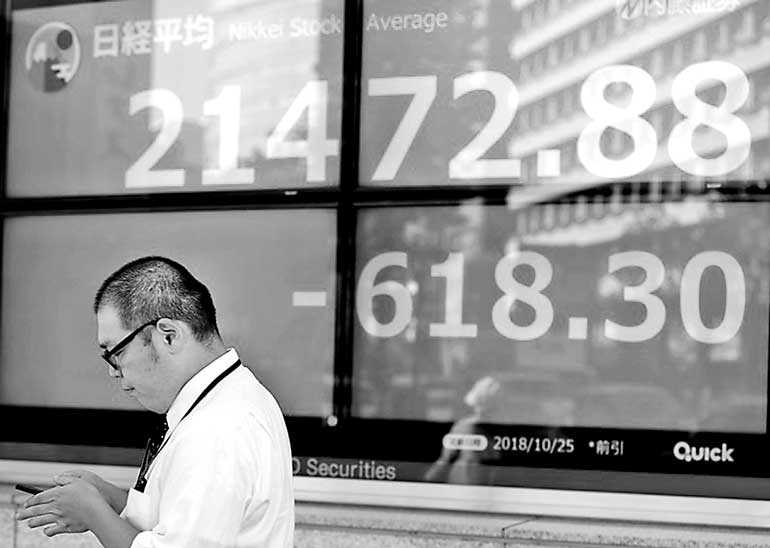Wednesday Feb 25, 2026
Wednesday Feb 25, 2026
Saturday, 27 October 2018 00:00 - - {{hitsCtrl.values.hits}}

SHANGHAI (Reuters): Asian shares skidded to 20-month lows, S&P futures fell sharply and China’s yuan weakened at the end of a turbulent week for financial markets on Friday, as anxiety over corporate profits added to lingering fears about global trade and economic growth.
The gloom enveloping Asia was at odds with a bounce on Wall Street overnight, highlighting fragile investor confidence, as shares of tech titans Amazon.com Inc and Alphabet Inc fell sharply after the closing bell on disappointing earnings.
In Friday’s Asian session, S&P E-mini futures slumped 0.88%, setting up a potentially rough session for US markets which had crumbled on Wednesday on concerns about earnings and sent global equities into a tailspin.
MSCI’s broadest index of Asia-Pacific shares outside Japan dropped 1.04%, erasing tiny gains made in the opening hour and hitting its lowest level since February 2017. Not helping was a slide in the Chinese yuan past a key level, refocusing market attention on slowing growth in the world’s second-biggest economy.
Shares in Europe are seen following Asia down, with London’s FTSE expected to open 0.9% lower, Germany’s DAX off 1% and France’s CAC 40 down 1.2%, according to David Madden, market analyst at CMC Markets UK.
“There’s no question that the weight of sentiment has been building,” said James McGlew, executive director of corporate stockbroking at Argonaut in Brisbane, highlighting in particular rising geopolitical tensions including Brexit, and “internal financial tension” in China.
“All of these things added up to the volatility hitting a boiling point... and I don’t’ think at the moment people should be trying to catch the falling knife,” he said.
The MSCI Asia index has been bruised by a heavy sell-off in the past several days, and is on course for its fifth weekly loss – its longest such streak since 2015. It has fallen more than 4% this week.
Chinese shares were pulled lower amid the generally dismal mood, and as the yuan fell past the psychologically important 6.96 level to the dollar, touching its lowest levels against the greenback since December 2016.
The blue-chip index was down 0.9% and the Shanghai Composite was 0.51% lower in afternoon trade.
Chinese shares have been hit by volatility this week amid a string of official announcements and measures aimed at supporting the markets following a recent plunge. The heavy sell-off has raised concerns about risks posed by about $620 billion worth of shares pledged for loans.
In Hong Kong, the Hang Seng index was 1.05% lower, with tech shares dropping 2.94%.
Tech firms also fell in South Korea, where the broader market slid 1.8%. The Kospi had earlier touched its lowest level since December 2016.
In Australia, shares ended flat at the end of a see-saw day. Japan’s Nikkei stock index closed 0.4% lower after a volatile session, ending the week down 5.98%.
Financial markets have been whipsawed in recent sessions on concerns over global growth as investors fretted over Sino-US trade frictions, a mixed bag of US corporate earnings, Federal Reserve rate hikes and Italian budget woes.
A slowdown in China has been particularly worrying for policy makers and investors, hitting asset markets from stocks to currencies and commodities. Friday’s fresh 22-month low for the yuan adds to the myriad of negative factors roiling investors.
Analysts at Capital Economics sounded a cautious note, suggesting that the bounce in the S&P 500 index on Thursday was only temporary as investors worries about the economic outlook worsen.
“The first, and most important (worry) is that Fed tightening and fading fiscal stimulus will cause the US economy to take a turn for the worse ... The second is that China’s economy will continue to struggle,” the analysts said in a note to clients.
“As we have been arguing for a while now, these worries are likely to get worse over the next twelve months or so.”
Investors will get a chance to check the US economic pulse later Friday when the government releases third-quarter GDP data.
ANZ analysts highlighted weak US core durable goods data as suggesting that “investment is not taking off, even with the apparent tailwind from tax cuts and USD repatriation.”
“This indicates that the boost to GDP growth from the fiscal stimulus could be fairly transitory,” the analysts said.
In currency markets, the euro fell, extending weakness after European Central Bank President Mario Draghi said the bank’s 2.6 trillion euro ($2.96 trillion) asset purchase program will end this year and interest rates could rise after next summer, despite fears about the monetary union’s economic and political future.
The single currency was 0.1% lower at $1.1363.
The dollar was off 0.2% against the yen at 112.18. The dollar index, which tracks the greenback against a basket of six major rivals, was 0.05% lower at 96.633.
US Treasury yields fell as equity markets plunged. The 10-year yield fell to 3.1018% compared with its US close of 3.136% on Thursday.
Oil prices gave up ground, heading for their third weekly loss after earlier rising on signals from Saudi Arabia’s energy minister that there could be a need for intervention to reduce oil stockpiles.
US crude dipped 1.07% to $66.61 a barrel. Brent crude fell 0.83% to $76.25 per barrel.
Spot gold ticked up 0.07% to $1,232.44 per ounce.